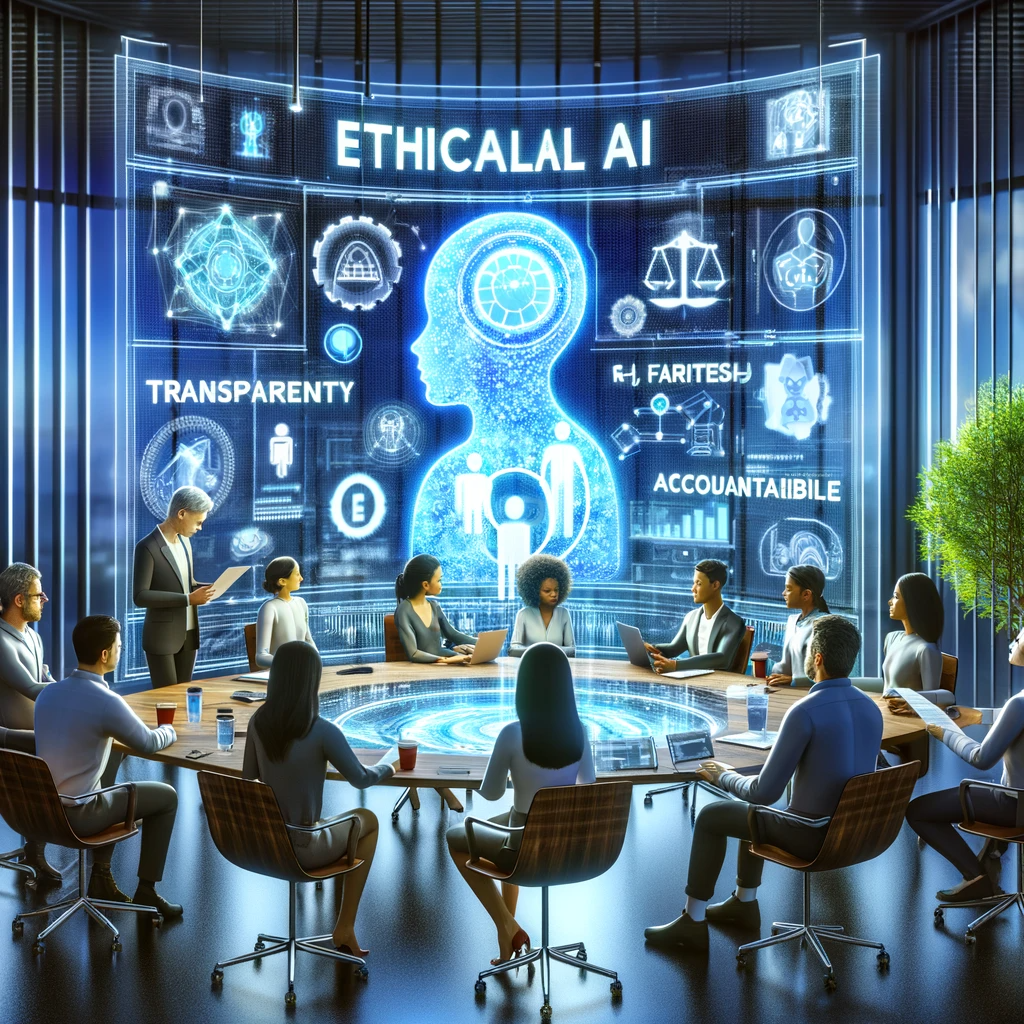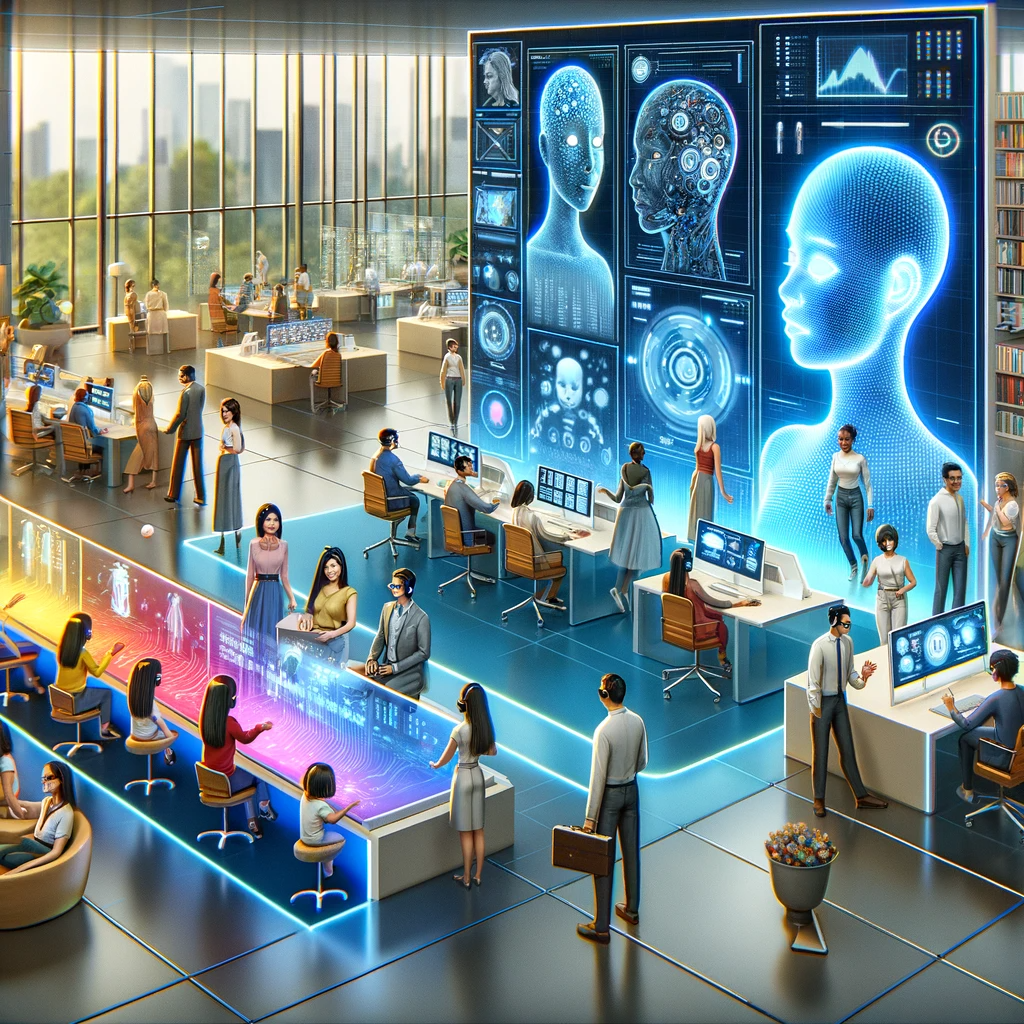Artificial Intelligence (AI) has been one of the most transformative technologies of the 21st century, revolutionizing various industries and shaping the way we live, work, and interact. As we embark on a new year, it is crucial to keep an eye on the emerging AI trends that will shape the technology landscape in 2024 and beyond. In this article, we will explore the AI trends to watch in 2024 and discuss their potential impact on the future.
Advancements in Reinforcement Learning: Expanding the Frontiers of AI Autonomy


Reinforcement learning, a subfield of AI, focuses on training algorithms to make sequential decisions by rewarding positive outcomes and penalizing negative ones. In recent years, we have seen remarkable progress in reinforcement learning, with algorithms like Deep Q-Networks (DQN) and Proximal Policy Optimization (PPO) achieving impressive results in domains such as games and robotics.
In 2024, we can expect significant advancements in reinforcement learning algorithms. These advancements will open doors to more complex tasks and applications, enabling AI systems to learn and adapt in real-time environments.
For example, reinforcement learning will find applications in autonomous vehicles, where AI agents can learn to make split-second decisions based on real-time sensor data, improving safety and efficiency on the roads. Furthermore, in the field of robotics, reinforcement learning will enable robots to acquire new skills through trial and error, enhancing their ability to perform complex tasks in unstructured environments.
Ethical AI and Responsible AI Practices: Ensuring Fairness, Transparency, and Accountability


As AI becomes more pervasive, the need for ethical AI and responsible AI practices becomes crucial. There have been growing concerns about the ethical implications of AI, including issues related to bias, privacy, and transparency. In response to these concerns, organizations, policymakers, and researchers are actively working on developing frameworks and guidelines to ensure that AI is developed and deployed responsibly (Accenture 2023).
In 2024, we can expect a heightened focus on developing AI systems that are transparent, fair, and accountable. Organizations will prioritize ethical considerations, ensuring that AI algorithms are free from biases and adhere to legal and ethical norms. The development of explainable AI models will play a significant role in building trust and ensuring that AI systems can be audited and understood. Explainable AI will provide insights into how AI algorithms make decisions, allowing humans to identify and rectify potential biases or errors.
Moreover, responsible AI practices will involve incorporating diverse perspectives during the development process to mitigate biases and ensure that AI systems benefit all users equally. This includes considering the ethical implications of AI applications, such as facial recognition technology, and implementing safeguards to protect individual privacy and civil liberties.
AI-Powered Cybersecurity: Combating Evolving Threats with Intelligent Defense Systems
Cybersecurity threats continue to evolve, and AI is poised to play a pivotal role in defending against these threats. In recent years, AI has demonstrated its effectiveness in detecting and responding to cyberattacks. Machine learning algorithms can analyze vast amounts of data, identify patterns, and detect anomalies that might indicate potential security breaches.
In 2024, we can anticipate a rise in AI-powered cybersecurity solutions that leverage machine learning algorithms to detect and respond to cyberattacks in real-time. These solutions will enable organizations to strengthen their defense mechanisms against emerging threats such as ransomware, phishing attacks, and zero-day vulnerabilities. AI-powered cybersecurity systems can identify and block malicious activities, provide early warnings, and even autonomously respond to attacks, reducing response times and minimizing the impact of security breaches (Forbes 2023).
Additionally, AI will empower cybersecurity professionals to anticipate and proactively mitigate emerging threats. By leveraging AI’s ability to analyze vast amounts of data, cybersecurity experts can gain insights into evolving attack patterns and develop proactive strategies to counteract them. AI-powered threat intelligence platforms will enable organizations to stay one step ahead of cybercriminals and protect sensitive data and critical infrastructure.
Edge Computing and AI: Empowering Real-Time Decision-Making at the Edge
Edge computing, which involves processing data closer to the source instead of relying solely on cloud infrastructure, is gaining momentum. This approach reduces latency, enhances privacy, and enables real-time decision-making. With the proliferation of Internet of Things (IoT) devices and the increasing demand for low-latency applications, edge computing has emerged as a promising solution.
In 2024, we can expect the convergence of edge computing and AI, leading to the rise of intelligent edge devices. This combination will bring AI algorithms directly to edge devices, enabling real-time data processing and analysis without relying heavily on cloud connectivity. Intelligent edge devices will have built-in AI capabilities, allowing them to make autonomous decisions, interact with other devices, and respond to real-time events (Linkedin 2023).
This integration of AI and edge computing will have significant implications across various sectors. For example, in healthcare, intelligent edge devices can process patient data in real-time, allowing for timely interventions and reducing the burden on centralized healthcare systems. In manufacturing, AI-powered edge devices can optimize production processes, predict maintenance needs, and reduce downtime. Moreover, in smart cities, intelligent edge devices can monitor traffic patterns, optimize energy consumption, and enhance public safety.
AI in Healthcare: Transforming Diagnostics, Treatment, and Patient Care


AI has already made significant strides in healthcare, and its impact will continue to grow in 2024. The healthcare industry generates massive amounts of data, including electronic health records, medical images, genomic information, and wearable device data. AI algorithms can analyze this data to derive valuable insights, improve diagnostics, and personalize treatment plans.
In 2024, we can expect AI-powered solutions for disease diagnosis, drug discovery, personalized medicine, and patient monitoring to become more prevalent. AI algorithms will analyze medical images, such as X-rays, MRIs, and CT scans, to provide accurate diagnoses and assist radiologists in detecting abnormalities. This can lead to faster and more precise diagnoses, ultimately improving patient outcomes.
Personalized medicine, which tailors medical treatments to individual patients based on their genetic makeup, will also benefit from AI advancements in 2024. AI algorithms can analyze genomic data to identify genetic markers associated with certain diseases, predict disease risks, and recommend personalized treatment plans. This approach has the potential to revolutionize healthcare by providing targeted therapies and interventions, leading to better patient outcomes and reducing healthcare costs.
Natural Language Processing (NLP) and Conversational AI: Enhancing Human-Machine Interactions


Natural Language Processing (NLP) has witnessed tremendous advancements in recent years, enabling machines to comprehend and generate human language with increasing accuracy. AI-powered chatbots and virtual assistants have become more widespread, offering enhanced language understanding and more natural interactions.
In 2024, we can expect further advancements in NLP and conversational AI. AI-powered chatbots will become more sophisticated, capable of understanding complex queries and providing more contextually relevant responses. Virtual assistants, such as Amazon’s Alexa and Apple’s Siri, will continue to improve their language understanding capabilities, enabling users to interact with their devices more naturally and intuitively.
NLP will find applications in customer service, content generation, language translation, sentiment analysis, and more. AI-powered chatbots will enhance customer service experiences by providing instant, accurate, and personalized support. Content generation algorithms will assist in writing articles, reports, and even creative pieces, saving time and enhancing productivity for content creators. Language translation services will become more accurate and natural, breaking down language barriers and facilitating global communication. Sentiment analysis algorithms will analyze social media posts, customer reviews, and other text data to gauge public opinion and help businesses make data-driven decisions.
AI’s Role in Climate Change Mitigation: Leveraging Technology for a Sustainable Future
The fight against climate change is one of the most pressing global challenges of our time. AI innovations can play a crucial role in mitigating climate change by optimizing energy consumption, reducing greenhouse gas emissions, and improving the efficiency of renewable energy systems.
In 2024, AI will be used to optimize energy consumption in various sectors. Machine learning algorithms can analyze data from smart grids, energy usage patterns, and weather forecasts to optimize energy distribution, reduce waste, and identify opportunities for efficiency improvements. This can lead to significant energy savings and lower carbon emissions.
AI-powered algorithms can also help optimize renewable energy systems. By analyzing weather patterns, energy demand, and energy production data, AI can optimize the deployment of renewable energy resources such as solar and wind power. AI can predict energy generation levels, anticipate fluctuations, and optimize the integration of renewable energy into the power grid, making it more reliable and cost-effective.
Embrace the Future with SmartDev: Leading the Way in AI-Driven Innovation:
As we look ahead to 2024, the AI landscape promises exciting developments with transformative potential. Reinforcement learning advancements, ethical AI practices, AI-powered cybersecurity, edge computing, AI in healthcare, NLP and conversational AI, and AI for climate change mitigation are among the trends to watch. These advancements will shape our future by revolutionizing industries, improving decision-making, and enhancing our quality of life. It is crucial to embrace these trends responsibly, ensuring that AI systems are developed with ethics, transparency, and accountability at their core.
In a rapidly changing world, SmartDev stands ready to guide organizations through their AI journey, providing tailored solutions that address specific challenges and capitalize on emerging opportunities. Our team of experts brings deep domain knowledge and technical expertise to deliver high-quality, customized AI solutions that meet the unique needs of our clients.
By partnering with SmartDev, businesses can unlock the full potential of AI, gain a competitive edge, and drive sustainable growth. Together, we can navigate the complexities of the digital age, embrace innovation, and shape a future where AI technology serves as a catalyst for progress.
Embrace the possibilities of AI with SmartDev today and unlock new horizons of success!
References:
(2023) AI and Edge Computing: Empowering Real-Time Decision Making, accessed 8 December 2023. https://www.linkedin.com/pulse/ai-edge-computing-empowering-real-time-decision-making-scalebuildai/
(2023) Responsible AI | AI Ethics & Governance | Accenture, accessed 8 December 2023. https://www.accenture.com/us-en/services/applied-intelligence/ai-ethics-governance
SAP Guest (2023) Why Evolving AI Threats Need AI-Powered Cybersecurity, Forbes website, accessed 8 December 2023. https://www.forbes.com/sites/sap/2023/10/04/why-evolving-ai-threats-need-ai-powered-cybersecurity/?sh=301bba2972ed



